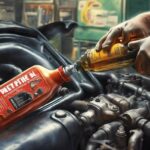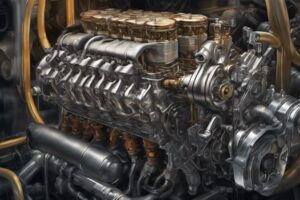When your car hits a bump with a P0304 code, signaling a misfire in cylinder 4, it's clear the engine's smooth performance is off-key. This issue can throw off your car's harmony, but there's no need to stress.
By diving into what causes this misfire and how to fix it, you can get your engine humming beautifully again. It's all about understanding the problem, finding its roots, and applying the right fixes to boost your vehicle's performance.
Let's walk through fixing this misfire together, ensuring your engine runs at its peak.
Understanding the P0304 Diagnostic Code
When diagnosing the P0304 diagnostic code, focus on pinpointing the specific cylinder causing the misfire. The ignition system and fuel injection play crucial roles in the operation of each cylinder.
To address the misfire in cylinder 4, start by checking the ignition system components. Ensure that the spark plug is in good condition, with the correct gap, and that the ignition coil is functioning properly. Test the spark plug wire and connections to rule out any issues.
Moving on to the fuel injection system, inspect the fuel injector for clogs or leaks that could affect the fuel delivery to cylinder 4. Check the fuel pressure to guarantee it meets the manufacturer's specifications. Additionally, examine the intake manifold for any vacuum leaks that might impact the air-fuel mixture reaching cylinder 4.
Thoroughly analyzing the ignition and fuel systems will help in identifying and rectifying the misfire in cylinder 4 efficiently.
Common Causes of Cylinder 4 Misfires
To further understand the issues leading to cylinder 4 misfires, it's imperative to explore the common causes behind this specific problem.
- Spark Plug
A faulty or worn-out spark plug can lead to cylinder 4 misfires. When the spark plug fails to ignite the air-fuel mixture properly, it can cause a misfire in the cylinder.
- Fuel Injector
A clogged or malfunctioning fuel injector can also be a culprit behind cylinder 4 misfires. If the fuel injector isn't delivering the right amount of fuel or if it's spraying fuel unevenly, it can disrupt the combustion process in cylinder 4.
- Ignition Coil
Another common cause of cylinder 4 misfires is a faulty ignition coil. The ignition coil is responsible for generating the high voltage needed to create a spark in the spark plug. If the ignition coil is faulty, it can lead to inconsistent sparks and misfires in cylinder 4.
Diagnostic Steps to Identify the Issue
Begin by conducting a thorough inspection of the ignition system components to pinpoint the source of the cylinder 4 misfire. Check the spark plugs, ignition coils, and wiring for any signs of damage or wear. Use a scan tool to identify any specific trouble codes related to the ignition system or cylinder 4. The following table outlines diagnostic steps to help identify the issue:
| Diagnostic Steps | Description |
|---|---|
| Check Ignition Coils | Inspect for cracks, carbon tracking, or other visible damage. Ensure proper connection and function. |
| Test Spark Plugs | Examine for fouling, wear, or gap issues. Replace if necessary. |
| Scan for Trouble Codes | Use a scan tool to retrieve any stored trouble codes related to cylinder 4 or the ignition system. |
Additionally, consider testing the fuel injector for cylinder 4 to ensure it is delivering fuel properly. By thoroughly examining the ignition system and fuel injector, you can effectively identify the root cause of the cylinder 4 misfire.
Fixing Cylinder 4 Misfire Issues
Inspect the ignition components thoroughly to address and resolve the cylinder 4 misfire issue effectively. Start by checking the spark plug for any signs of wear or damage. A faulty spark plug can lead to misfires and should be replaced if needed.
Next, examine the fuel injector to ensure it's delivering fuel properly to the cylinder. A clogged or malfunctioning fuel injector can cause misfires and should be cleaned or replaced as necessary.
Preventing Future Misfires
Ensuring proper maintenance of ignition components is essential for preventing future misfires. Regularly inspect and replace spark plugs according to your vehicle manufacturer's recommendations. Worn-out spark plugs can lead to incomplete combustion in the cylinder, causing misfires. Additionally, check the ignition coils for signs of damage or wear, as faulty coils can result in cylinder misfires. Properly functioning fuel injectors are crucial for optimal engine performance. Consider using fuel injector cleaner additives periodically to prevent clogs and ensure proper fuel delivery.
Regularly changing the air filter is another key maintenance tip to prevent future misfires. A dirty air filter can restrict airflow to the engine, affecting the air-fuel mixture ratio and potentially causing misfires. Moreover, keeping the engine properly tuned by following the recommended maintenance schedule is essential for preventing misfires and maintaining overall engine performance. By staying proactive with these maintenance tips, you can help safeguard your engine against misfire issues and ensure smooth operation.
As an Amazon Associate we earn from qualifying purchases.








